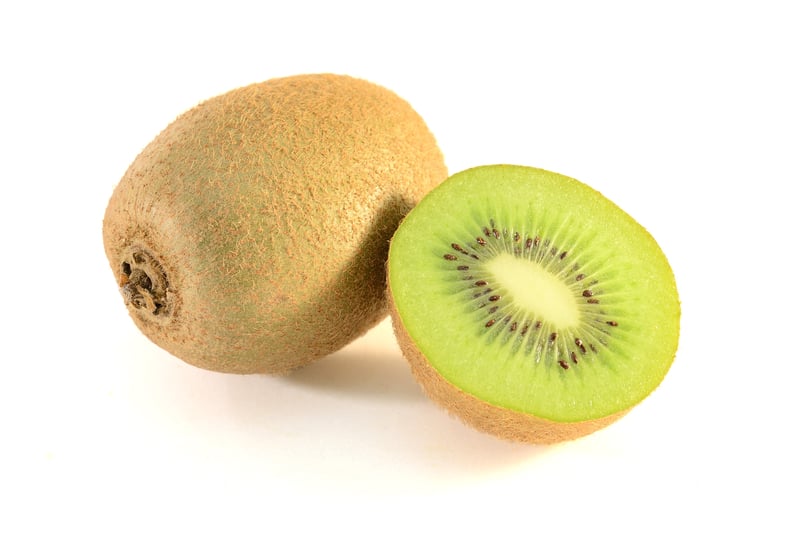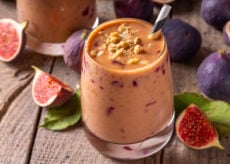12+ Drinks & Foods to Help You Sleep Well

If you want to improve just about any area of your life, it starts with getting enough (but not too much) quality sleep. The body needs sleep to rest, repair, and rebuild. And if you aren’t getting enough, it doesn’t just lead to feeling tired. It can lower your mood, decrease motor skills, plummet performance, and inhibit your immune functioning. Fortunately, there are drinks and foods to help you sleep, even when it’s a bit difficult to catch some quality ZZZs.
Skipping Sleep: An Epidemic
Far too many of us (more than one-third) put off sleep. 1 After all, there’s so much to do. We have to make sure we finish that project, convince our kids (or grandkids) to practice, spend time with family and friends, prepare and eat dinner, keep the house tidy, and then scroll through socials or watch “just one more” episode of our latest show to decompress.
Sadly, that makes it harder for the brain and body to shut down. We remain so overstimulated during the day that it feels challenging to close our eyes and gently drift to sleep. And once we do finally manage to get to sleep, it’s not always easy to stay asleep.
Yet when it comes to health risks, sleep deprivation ranks right up there with cigarette smoking, obesity, and severe stress. It’s associated with increased markers of inflammation, including cytokines, interleukin-6, and C-reactive protein, among others. This explains why poor sleep is considered a risk factor for high blood pressure, diabetes, cardiovascular disease, and more. Lack of sleep also prevents the brain from doing necessary housecleaning processes, which can cause beta-amyloid buildup. This, in turn, has been shown to make it harder to consolidate memories. It also makes it more difficult to sleep. (Talk about a vicious cycle.) 2, 3
We’ve often heard of the importance of proper sleep hygiene. And, make no mistake, it is vitally important. Yet another way to encourage more restful and restorative nights is by enjoying the right drinks and foods to help you sleep.
You see, what we consume directly impacts hormones vital for healthy sleep. For instance, vitamins B6, B12, and folic acid directly influence levels of serotonin. And if we don’t get enough of these nutrients, it can lead to poor sleep.
A lack of other key nutrients can also negatively affect sleep. For instance, magnesium, iron, and zinc have been found in research to support longer-lasting sleep. 4 Other research found that the essential omega-3 fatty acids DHA and EPA can help decrease how long it takes to drift off to sleep. 5 High-protein diets have likewise been associated with more quality sleep. 6 And finally, foods that are rich in serotonin or melatonin (or the amino acid tryptophan, which is a precursor to these hormones) may help calm the mind for a more restful night. 7
Drinks and Foods to Help You Sleep
It’s true that there are no drinks or foods that will magically help you effortlessly drift off to sleep and stay that way until you awake seven to nine hours later, feeling fully rested. Don’t we wish?! But some foods may help.
Though none are guaranteed, here are some good choices to help you enter into and make the most of dreamland:
1. Figs
In addition to helping crush a sugar craving, figs are packed with fiber, potassium, magnesium, calcium, and iron, which are nutrients that help support blood flow for more restful sleep. Plus, the fiber helps keep you full, as going to bed hungry can also keep you awake.
2. Watermelon
Watery fruits can help you fight dehydration, a condition that’s known to make it more difficult to fall asleep, as well as negatively impact energy levels during the day. Because watermelon provides fiber with mostly water, it can help keep your belly from rumbling for a more restful night. Other water-rich fruits include apples, cantaloupes, oranges, and pears. If you’re prone to heartburn, though, avoid citrus fruits shortly before bed.
3. Kiwi
High in a number of vitamins and minerals, like C, E, potassium, and folate, kiwis are a small fruit individually portioned for an evening treat. As a bonus, some research has found that people with sleep disturbances who ate a couple of kiwis an hour before bed fell asleep faster and enjoyed greater sleep quality than folks who didn’t. 8
4. Tart Cherries
Rich in magnesium, phosphorus, potassium, antioxidants, and melatonin, a small glass of tart cherry juice may help improve sleep quality and total sleep time. 9
5. Bananas
Another convenient option is the humble banana. This popular fruit provides a nice dose of magnesium and potassium along with vitamin B6, all of which can support greater relaxation.
6. Oatmeal
It’s not just for breakfast! This whole-grain superstar provides slow-digesting carbohydrates, plenty of fiber, and is also a good source of melatonin and zinc. That makes bananas a convenient and worthy bedtime snack. Other whole-grain options to help promote more restful sleep include bulgur and brown rice.
7. Sweet Potato
High in fiber, rich in potassium, magnesium, and calcium, another great bedtime snack is the humble sweet potato. If a baked sweet potato sounds a little odd, consider sweet potato toast, which is simply sliced and then baked (or air-fried) sweet potato. Add a bit of ricotta cheese or nut butter for a delicious, filling, and sleep-supporting nighttime snack.
8. Hummus
Made with chickpeas, hummus is another food that’s a good source of tryptophane. Due to its supply of quality protein and fiber, it also has a lot of staying power, which means you’ll be less likely to wake up during the night due to hunger.
9. Golden Milk
This unusual yet delicious drink combines the sleep-aiding potential of milk with the potent antioxidant-rich herbs turmeric and ginger with a touch of honey for a soothing, flavorful beverage millions of people enjoy. For even greater results, add Golden Milk to your pre-bedtime ritual to invite in a good night’s rest.
10. Nuts
Other nutrient-rich, convenient options are nuts of many kinds. Almonds, for instance, are high in phosphorus, riboflavin, manganese, magnesium, good fats, fiber, and antioxidants. They also provide melatonin, which helps regulate circadian rhythms to help your body prepare for sleep. 10 And walnuts are also rich in magnesium and melatonin. Other foods rich in this sleep-supporting hormone include eggs, fish (especially fatty fish like salmon, mackerel, and sardines), and some types of mushrooms.
Pistachios provide a good dose of protein, healthy fats, vitamin B6, and magnesium, which all support a good night’s rest.
Whichever nut you choose, keep the serving size to an ounce or less (i.e., around a handful), as eating too much can have the opposite effect and make it harder to sleep.
11. Milk
Remember when mom, grandma, or another older relative recommended a warm cup of milk before bed when you couldn’t sleep? There’s good reason for this suggestion. Milk is a good source of the amino acid tryptophan, which is a precursor to serotonin and melatonin. 11 It’s also a good source of vitamin D, which has been linked with improved sleep. If warm milk doesn’t sound like your cup of tea, you may also benefit from other high-protein dairy foods that prevent you from going to bed hungry. Soothing options include Greek yogurt, cheese, and even a protein shake, especially one that contains slow-releasing casein protein.
Not a fan of dairy milk but still want the benefits of a warm cup of milk? Almond milk is also rich in magnesium, tryptophan, and also provides some protein to help support a more restful night.
12. Herbal Teas
Leave the black and caffeinated green teas for earlier in the day. As dusk approaches, it’s time to switch to more soothing herbal teas to help you calm your nerves and prepare for the night. Chamomile tea helps you hydrate, relax, and may even soothe the stomach. Other recognized sleep-supporting herbal teas include lavender, St. John’s Wort, valerian, lemon balm, magnolia bark, passionflower, ashwagandha, and decaffeinated green tea.
Nighttime Foods to Avoid
Of course, drinks and foods you don’t eat can also impact the quality of your shut-eye. Foods to steer clear of include:
- Heavy, rich foods like those that are deep-fat fried
- Spicy or acidic foods that can cause heartburn, like tomato sauce and orange juice
- Alcoholic beverages
- Caffeinated beverages, including coffee, black and green tea, and energy and sports drinks
- Sugary foods or those high in refined carbohydrates, which may help you fall asleep initially but then cause a restless night of sleep 12
It can also make it harder to sleep no matter what you eat if consumed too close to bedtime. Most experts recommend finishing your last meal or snack at least one hour before bed. That’s true even with foods that may help you sleep.
Foods to Help You Sleep: A Wrap-Up
Again, there are no magic foods that will transform a sleepless night into the best sleep ever. But there is a big connection between how you eat during the day and how well you sleep at night. It’s important to look at your entire nutrition picture. Eating a healthy, whole-food diet with plenty of quality proteins, lots of fiber-rich vegetables, fruits, and whole grains, will provide your body with the nutrients it needs. Nutrients that can also help support healthy sleep. Combined with a good sleep hygiene plan, you may quickly find the foods above can help transform your tossing and turning into more restful nights.





 7 Signs Your Body is Seriously Low on Collagen (not just wrinkles)
7 Signs Your Body is Seriously Low on Collagen (not just wrinkles) Health Expert: "Turmeric Doesn't Work (unless...)"
Health Expert: "Turmeric Doesn't Work (unless...)" 3 Warning Signs Your Probiotic Supplement is a Total Waste
3 Warning Signs Your Probiotic Supplement is a Total Waste

